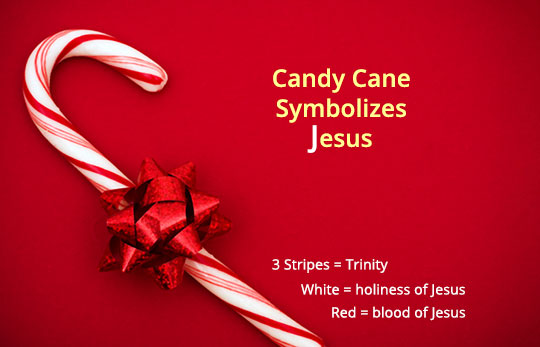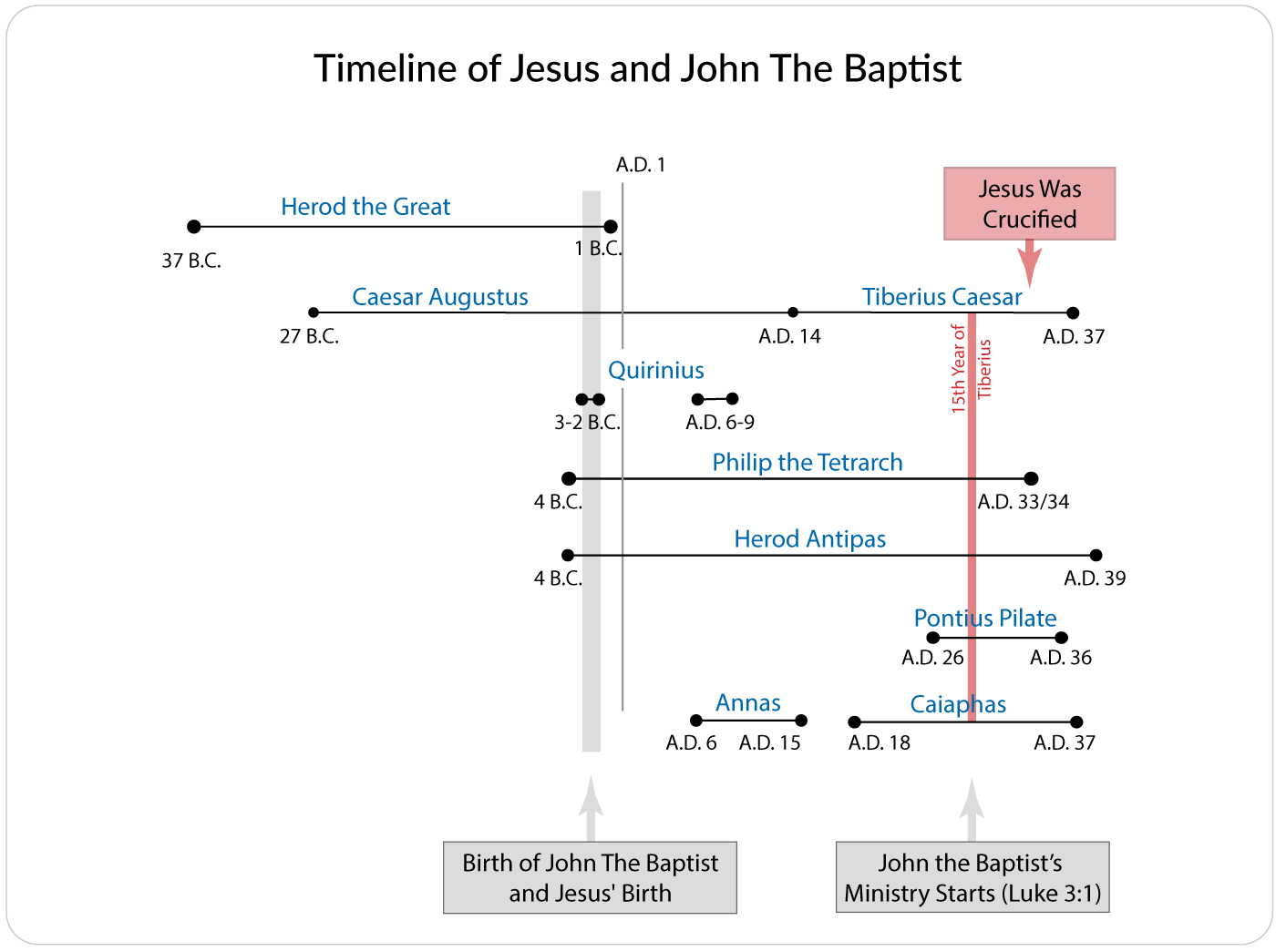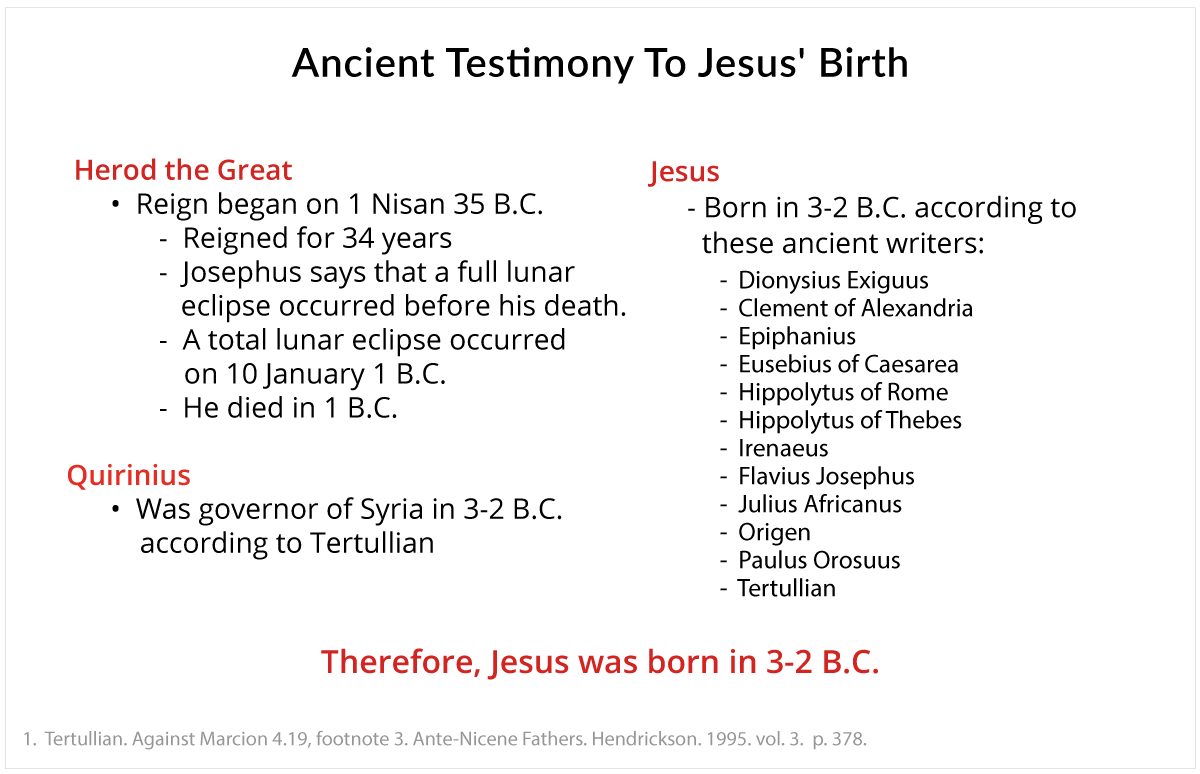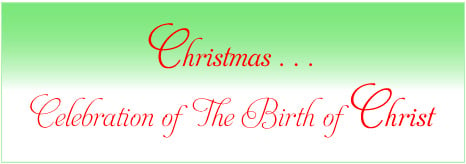Given that some Christians debate the exact day on which Christmas should be celebrated, would it not be nice if there was a chapter and verse that said that we should celebrate Christmas on December 25th? It would solve a major problem for some Christians. However, we can be sure if such a verse did exist, someone would find a reason to debate the Scripture verse. This study will answer a series of questions related to Christmas. One of the questions is, “Should we celebrate Christmas on December 25?”

In What Year Was Jesus Born?
The first question we will examine is, “In what year was Jesus born?” Now the answer might seem to be very simple since many claim Jesus was born 7 to 6 B.C. You might say, “I heard He was born about 6 to 4 B.C.” Others claim His birth date was 3 to 2 B.C. So our question is, “What is the correct date?”
The answer must start with Luke 2:1-2 since this passage gives us some historical references.
Now in those days a decree went out from Caesar Augustus, that a census be taken of all the inhabited earth. This was the first census taken while Quirinius was governor of Syria. Luke 2:1-2 (NASB)
These two verses provide great historical information. In verse 1 we are told that Caesar Augustus was reigning as the Roman emperor at the time the events in Luke 2 occurred. History tells us that he reigned from 43 B.C. to A.D. 14.
When Luke tells us that Jesus was born during the reign of Caesar Augustus, this reveals that Jesus could have been born anywhere from 43 B.C. to A.D. 14, since those are the beginning and end dates of Caesar Augustus’ reign.
Verse 2 constrains the dates of Christ’s birth since it is most likely that Quirinius, governor of Syria, reigned between 3 to 2 B.C. or between 6 to 9 A.D. This means the time of Christ’s birth most likely occurred about 3-2 B.C. The early Church father Tertullian provides some evidence that Quirinius did reign during the time of 3-2 B.C. [1] Josephus, in his book called The Antiquities of the Jews, section 17.89, supports Tertullian.[2]
In verse 1 we are also told that Caesar Augustus issued a decree or a census. We can thank God that Tertullian[3] and Justin Martyr[4], early Church fathers, who lived roughly A.D. 114 to 220, both report that there was a record of the decree regarding the census in the archives at Rome.[5] The evidence strongly supports a date of 3 B.C. or 2 B.C. for Christ’s birth.
Now remember that in Luke 2 we are told Jesus was born. Angels told some shepherds to go to the manger and find Jesus who would be wrapped in swaddling clothes. The swaddling clothes would be a sign so that they could find Him. In modern times we often find magi in nativity scenes along with the shepherds, but that did not actually happen. The magi arrived much later.
For example, in verse 16 of Matthew 2, we are told that the magi arrive (Matthew 2:7-12). After the magi’s visit, they left. Now notice Herod’s response.
Then when Herod saw that he had been tricked by the magi, he became very enraged, and sent and slew all the male children who were in Bethlehem and all its vicinity, from two years old and under, according to the time which he had determined from the magi. Matthew 2:16 (NASB)
Herod had every child two years and younger murdered. The two years were determined according to the time of the star’s appearance given to Herod by the magi. What did the magi tell Herod the Great? The magi revealed to Herod that Christ had been born within a two year period. Now it is possible it was only a one year period.

There is an interesting historical point we need to think about. History tells us that Herod the Great reigned from 47 B.C. to 4 B.C. This means that Herod the Great died in 4 B.C. after he murdered all the children who were two years old and younger. That would indicate Jesus was born somewhere between 5 B.C. to 4 B.C.
This conclusion seems to be a problem since Quirinius probably reigned between 3 to 2 B.C. We thank God that Flavius Josephus, a Jewish historian who wrote for Rome, reports that Herod died after an eclipse of the moon and before the Feast of Unleavened Bread.
Astronomical calculations indicate that two eclipses of the moon occurred in Jerusalem in 5 B.C., one in 4 B.C., none in 3 B.C., none in 2 B.C. and one on 10 January 1 B.C.[6,7] The year of 1 B.C. is important since the other eclipses of the moon were very short. In his writings, Josephus describes a great number of events that occurred between the eclipse of the moon and the Feast of Unleavened Bread. The only eclipse of the moon that fits the required time is the one in 1 B.C. This strongly suggests that historians have made a mistake in saying that Herod the Great died in the year 4 B.C.
Now let’s look for some proof. History tells us that Phillip the Tetrarch started reigning after Herod the Great and died in A.D. 33-34. Researchers have found fifty-one copies of Flavius Josephus in the British Archives and the Library of Congress. Those copies state that Phillip the Tetrarch’s reign did not end in the twentieth year of Tiberius Caesar but in the twenty-second year. Therefore, if Phillip the Tetrarch’s reign ended in the twenty-second year, then Phillip the Tetrarch did not die in A.D. 33-34 but in A.D. 35-36. Therefore, his reign really began in 2-1 B.C. which in turn means Herod the Great actually died in 2-1 B.C. Consequently, we must move Jesus’ birth forward to the period of 3-2 B.C. If Herod added additional time to the original date the star appeared, which is likely to ensure he killed the little king of the Jews, then Christ’s birth could have occurred in 3-2 B.C.
Some may think that is a lot of detail. Is there any other information about the time of Christ’s birth?” Yes, the early Church fathers report that Jesus was born in 3 to 2 B.C. Now since Jesus was born when Caesar Augustus and Herod the Great were reigning and when Quirinius was governor of Syria, then the only time the reigns of all three overlap is in the years 3 and 2 B.C. If we study the early Church fathers, Dionysius, Eusebius, Hippolytus, Irenaeus Josephus, Julius Africanus, and Origen and others, all state that Jesus was born in the years 3-2 B.C. All the evidence supports the years of 3-2 B.C. as the time of Christ’s birth.

In What Month Was Jesus’ Born?
The next question is, “On what day and month was Jesus born? The major reason that people say Jesus could not have been born on December 25th is that it would have been too cold at night to be outside shepherding sheep. Notice what Luke 2:8 says,
In the same region there were some shepherds staying out in the fields and keeping watch over their flock by night. Luke 2:8 (NASB)
Those who say Jesus could not have been born on December 25 believe it would have been too cold for the shepherds to be outside. They imagine snow on the ground, but the temperatures in Jerusalem are like those in southern Arizona. How often does Tucson, Arizona have snow in December? The answer is not very often, except for in the mountains.
Dr. Harry Mulder of the Netherlands visited Jerusalem many years ago on a Christmas Eve. While he was at the Shepherds’ Field, people were singing carols and there were shepherds with sheep out in the chilly evening. Do you know what this tells us? It tells us that sheep could be outside at night at Christmas time in Jerusalem. Since Bethlehem is only five miles away from Jerusalem, this means that there could have been shepherds with sheep in December. The argument that Jesus could not have been born on December 25 because it was too cold for sheep to be outside does not stand the test of truthfulness.
So the question is, “Was Jesus born on December 25th?” Two early Church fathers, Clement of Alexandria and Epiphanius make two important statements. They say that Christ was born eight days before the Ides of January. The Ides of January is a Roman term referring to the 13th day. The other statement says that Christ was born thirteen days after the winter solstice. If we count eight days from January 13, we arrive at January 6 since the initial day is included in the count. If we start with the winter solstice and count forward thirteen days we arrive at January 6. Both statements of Clement of Alexandria and Epiphanius support a date of January 6th.
Other early church fathers, Hippoltytus of Rome and John Chrysostom, tell us that Christ was born on December 25. The evidence from these church fathers is that Jesus was born somewhere between December 25 to January 6.
Another approach to determining the month of Christ’s birth assumes that Zacharias was the high priest based on the testimony of the early church father John Chrysostom. In Luke 1 we are told that Zacharias was visited by an angel when he was serving in the temple (Luke 1:8-9).
Now it happened that while he was performing his priestly service before God in the appointed order of his division, according to the custom of the priestly office, he was chosen by lot to enter the temple of the Lord and burn incense. Luke 1:8-9 (NASB)
Since incense was burnt on the altar of incense, he was in the holy place, not the Holy of Holies. This would have occurred on the Day of Atonement, which is Yom Kippur, which occurs between mid-September to mid-October. This means that he received the announcement that his wife, Elizabeth, would become pregnant in September or October. If we assume that Elizabeth became pregnant immediately after Gabriel visited Zacharias, then six months later would be the months of mid-March to mid-April. If the phrase “six month” is a rounded number, then maybe the sixth month occurred between first of March to the first of April. Then if we assume that Mary became pregnant after Gabriel announced the birth of Christ, and we add nine months until Mary gave birth, then Christ may have been born in December or January. It is possible that the day of His birth was December 25. The early Church fathers chose that date. Scripture never tells us.
Why Do We Celebrate Christmas?
Now I have a good question for you. If both Paul and Christ tell us to celebrate His death, then why do we celebrate His resurrection? We call it Easter. Some of us call it Resurrection Sunday. If we should not celebrate Christmas because scripture does not tell us we should celebrate it, which is what some Christians believe, then why do we celebrate Resurrection Sunday since it is not commanded?
Christians have only been commanded to remember Christ’s death. Jesus did not command us to celebrate His death and resurrection, He said, “My death.” The bread and the cup speak of His body and His blood, not His resurrection. Does that mean we should not celebrate His resurrection or His birth?
Some Christians say we should not celebrate Christmas because of Galatians 4:9-11.
But now that you have come to know God, or rather to be known by God, how is it that you turn back again to the weak and worthless elemental things, to which you desire to be enslaved all over again? You observe days and months and seasons and years. I fear for you, that perhaps I have labored over you in vain. Galatians 4:9-11 (NASB)
Notice verse 10 says “You observe days and months and seasons and years.” Those who claim we should not celebrate Christmas say, “The verse teaches we should not be celebrating Christmas.” But look at the context. The context is about the practice of Judaism. The Galatians were going back to Judaism and practicing the feasts. The Mosaic Law had established the Passover, the Feast of Unleavened Bread, and a number of other feasts. In Galatians 4:9-11, Paul is rebuking them for going back to Judaism. That is what the argument of the book of Galatians is all about. He is not condemning all feasts but their desire to return to Judaism.
Some people say that we should not celebrate Christmas because Constantine replaced a pagan holiday with Christmas in 313 A.D. But if we go back in history, we discover that there is evidence from Clement of Alexandria that Christians were already celebrating Christmas in Egypt before 284 A.D., not in 305 A.D. The celebration of Christmas was nationalized later in the Roman Empire.
Clement of Alexandria also states that the Christians in Egypt celebrated the baptism of Christ. They celebrated His birth, His baptism, His death, and His resurrection. They did that before Christmas became a holiday in the Roman Empire. Apparently Constantine did make Christmas a holiday for the purpose of replacing a pagan holiday.
A question that will put everything in context is why shouldn’t we celebrate Christmas? Here is a real illustration that will help us put Christmas in perspective. There was a group called the Society of Iobacchus in ancient Greece. Now remember that the Romans and the Greeks had many different gods and goddesses: Dionysus, Venus, Jupiter—on goes the list of their gods and goddesses. The Society of Iobacchus worshiped a god, and in order to belong to this group, they required membership. They required their members to pay dues. They had a speaker. Members were required to attend meetings weekly. They sang songs, had readings, a moral code and members were expected to spend time with one another. Does that sound like what we do at church?
If that is what the Society of Iobacchus did, does that mean we should stop holding church services because we collect money, we have a speaker, we sing, we read and we have a moral code? Let me make this simple. Is there any part of our church services that does not appear similar to what some pagan or false religion practiced? If we were to eliminate everything that we are doing because some pagan group has done something similar, then there is no part of our church services not impacted.
When we come together, we do not come together to worship a pagan god. That is the difference. Why you are doing what you are doing is the issue. Personally, I think it is a great thing that Constantine replaced the pagan festival with a celebration to worship the true God. It is amazing how Christians can find fault with something that is good. We need to practice the right thing – not the wrong thing.
Just because there are similarities in the form of activities of the Society of Iobacchus, the Mormons, the Jehovah’s Witnesses or some other group and Christians does not mean we have to change our worship services. If so, we could not worship God. Sometimes, we can get trapped into legalism, in what somebody else is doing. Therefore, we have to be careful. The question is, why are we doing what we are doing? That is the issue. The issue is not similarity. The issue is not look-alike. The issue is why are we doing what we are doing?
What About the Christmas Tree?
Some people refer to Jeremiah 10:2-4 and say, “These verses talk about wood that is decorated with gold and silver.” But Jeremiah is talking about idol worship. He is talking about people who take wood, make it into an idol and then bow down and worship it. The rest of the chapter talks about the fact that the idol becomes their god. Our Christmas tree is not our God. If it becomes a god or an idol to you, then get rid of it. What is important is does it have symbolic meaning?
Some of you wear a cross on a chain. I do not think you believe your cross is a god. I think it is a symbol that reminds you of Christ. I know some people who use the cross as a means of evangelism. They put different items on the chain to engender a conversation about Christ.
Historical sources tell us that the first known use of a Christmas tree was in Germany. It was called the Paradise tree and the year was 1521. It was an evergreen tree. They put apples and wafers on it. You say, “Why did the Christians do that?” The answer is that they considered the Paradise tree a symbolical reminder of the Garden of Eden. The tree was green to indicate that it was perpetual. It reminded them of Genesis 3:15 which spoke of a coming Savior, who would save us from our sins and give us eternal life. The apples on the tree symbolized sin and wafers symbolized the promise of reconciliation with God made possible through Jesus Christ.. The tree was symbolic of the mess caused by sin and the promise that Jesus was coming to solve our sin problem. The Paradise tree was started by Christians. It was simply a symbol.
Later around 1605 in Strasberg, Germany, we find another reference from history to the Paradise tree. At that time candles were added to the Paradise Tree. As time goes by what happens is that more stuff is added to the tree! The important question is, “What does the tree mean to you?” If the tree and decorations are a problem to you, then it is a problem. If it just has symbolic meaning to you, then is is okay.
On Christmas Day, my grandson comes over and we talk about the tree being a symbol. I use the presents to illustrate the fact that Jesus came and died on the cross. Now He offers us the gift of eternal life. Ephesians 1 tells us that Christ has blessed us with every spiritual blessing in the heavenly places. Guess how many gifts that refers to? It is more than we can count!
Let’s count some of His gifts. Christians are told they are seated in heaven. Christians are forgiven. He gave Christians the Holy Spirit. He helps Christians pray. He does so much for us. Paul prays in the first chapter of Ephesians that we might understand what He has given to us. The implication is we have no clue all He has given to us.
When I studied this chapter, I spent weeks crying with joy over the passage as I realized how much God loves me. Realizing that God has given me so much that I cannot even imagine. It is terrific! The Christmas presents can remind us of what God has given us.
I was thinking about the Christmas story. What do you think happened when Jesus was born? Do you think Mary thought, “Oh, this is really disappointing. Oh, this is really a lousy time of the year.” I suppose it is possible she had post-partum syndrome, but I think Mary and Joseph had joy. Is it possible they had a feast or some kind of celebration? I do not think it was a sad time since she knew who was being born. She and Joseph were told by an angel who was being born. That must have been exciting for her!

The Candy Cane
I was surprised to learn, and this is attested to by a number of sources, that the candy cane was also another German idea. The “J” stood for Jesus. That is the reason that it is made in the form of a shepherd’s hook. The candy cane was designed by a choirmaster who wanted to give gifts to his students to remind them of Christ. The white stood for His purity, the red stood for the blood that was shed as the Romans lashed His back to pay for our penalty. The choirmaster wanted to give these candy canes to his students on Christmas to remind them of the fact that the Savior came to die for them. That is tremendous symbolism!
We have lost the meaning of the candy cane. Now we just look at it as candy and we think, “This is worldly!” That is correct if you have lost its meaning. If you lose the meaning, then you have lost the importance. You have lost it all.
Conclusion
Look at Acts 20:16. Remember that Paul the apostle was a Jew. He was a Pharisee. He was a follower of Judaism. Then he became a Christian, and what would you expect he would do with his Jewish roots? Dump them? Acts 20:16 says,
For Paul had decided to sail past Ephesus so that he would not have to spend time in Asia; for he was hurrying to be in Jerusalem, if possible, on the day of Pentecost. Acts 20:16 (NASB)
Do you know what Paul did even though Paul was a Christian. He was still involved in some of the feasts that he grew up with. Why? Because the origin of the feast was not the issue. The meaning of the feast was what was important – the heart attitude towards them. I trust that you have a different perspective about Christmas. Christmas is not about a tree and it is not about family. Our secular culture says Christmas is about family. Our culture has rejected Jesus Christ. They have turned Christmas into family time. They have abandoned Christ, but they want to continue with the festivities.
Christmas is not about feasts. It is not about candy canes. It is not about light bulbs. It is not about trees. It is not about stars. It is not about garlands. It is not about turkeys. It is not about pies. It is not about family. It is not about anything but Jesus, who was born in a manger to die someday on a cross so that we can live with Him forever. That is what Christmas is all about. If the tree helps you remember that, if the candy cane helps you remember that, if something else helps you remember that, then rejoice.
References:
1. Finegan, Jack. Handbook of Biblical Chronology. Hendrickson Pub., 1998, section 522. pp. 304-305.
2. Ibid.
3. Tertullian. Against Marcion. 4.7.
4. Justin Martyr. Apology 1.34.
5. Finegan. Ibid., section 526., p. 306.
6. Finegan. Ibid. section 504, p. 295.
7. Five Millennium Catalog Of Lunar Eclipses. (eclipse.gsfc.nasa.gov/LEcat5/LE-0099-0000.html)